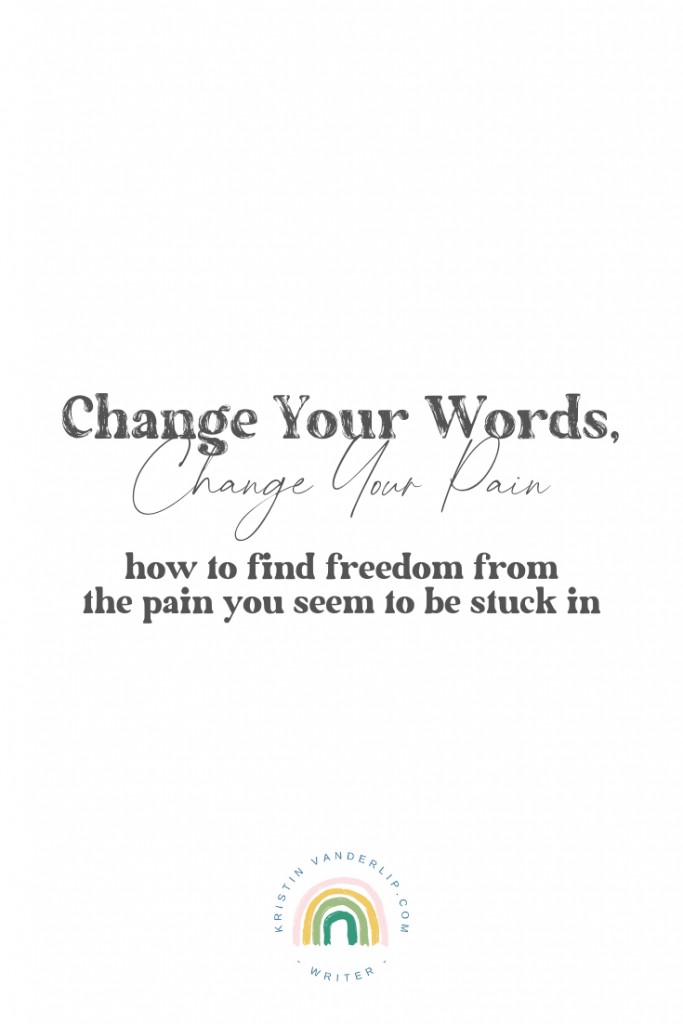As a writer, I’ve always known that word choice matters, but when it came to the words I use on a daily basis to shape my thought life, I’d honestly never paid much attention to my word choice. That was until the day, quite a few years ago, I showed up at the office of a new therapist.
On the chilly afternoon of my appointment, my heart drummed at a rapid pace that stole from my every breath. My heart had been very recently broken, and I was nervous and afraid to expose my wound. I knew it needed to be opened in order to be cleansed and healed properly, yet I also knew how this would sting. Even so, my assumption that I would find a safe landing place for my pain propelled me to put one foot in front of the other and show up even though I dreaded it.

What I didn’t expect was for my literal sob story to be challenged.
I sat upright in one of the stiff leather chairs. My body strained, trying to act as an inpenetrable container to hold the pain I’d been bottling up inside. Yet, my tears had their way, and I exposed the wound.
My therapist, an expert in his field, had a gentle, grandfatherly appearance and voice. This helped me trust him, though my body maintained a resistance. I talked and cried. He patiently listened. This was the dance I expected. But when I finished, he led me in a direction that turned me over. I froze trying to grasp his suggestion that seemed downright absurd.
I had repeatedly used a word to label the painful event that had brought me into his office. He asked me to rename it. At first, the idea felt not only hurtful (how dare he!) but also impossible. A part of me wanted to tell him off and bolt out of the room. But he anticipated this and moved slowly with me. I stayed. I took a breath and slowly opened myself up to his suggestion and decided to trust his leading.
Could changing one simple word offer me freedom from the prison of pain I found myself in?
He asked me to name all the synonyms I could think of for the word I used to describe the incident that had torn me apart. He invited me to consider the different meanings and nuances associated with each word, noticing the slight, but powerful difference in each. I began to see how the words I used impacted the level of pain I felt. The act of renaming what happened didn’t change what happened. The facts didn’t change, but my thoughts and feelings did. I tried out a few words to see how they fit and let myself weigh the impact as each one landed in the quiet room.
Suddenly, renaming this painful event created possibilities where I had seen none. This moment that initially made me want to flee became like stumbling upon a stream in the desert or witnessing the sea I was drowning in suddenly parting and revealing dry ground. A simple word was like being handed the key to my jail cell.
I had discovered, just as author Adam Alter wrote in his well-researched piece “The Power of Names,” “…as soon as you label something, you change how it’s perceived.”
What had happened was out of my control. It had happened and could not be changed or undone. It was my task to learn how to accept that and change what I could (hello Serenity Prayer). I could choose the words I used and in doing so shift the narrative.
As I named this painful event in a new way, I changed my perception of it. As my perception changed, my body relinquished the pain that had kept me shackled. There was a ripple effect of transformation.
The power of naming (or renaming) provides us with the potential to find freedom from perpetual pain.

We see the power of words in Scripture. In Genesis, we see how God uses words to bring life and sustain life; how he speaks life into existence. We see the power of our tongues in the book of Proverbs: “The tongue has the power of life and death” (18:21). What words do we use when we speak of our stories and selves? Are we naming and labeling with accuracy? Are our words hurting or healing our hearts?
Sometimes we get stuck in an unhelpful and unhealthy narrative. Sometimes we can even grow comfortable in our pain. Can we gently and lovingly challenge ourselves here? Can you identify a word or thought on repeat when it comes to your circumstances or self? Is there a narrative or word you can flip or shift ever so slightly? What might you reframe and rename? Can you make a list of your own snynonyms and try each word on to see how it fits and feels?
This month I want to invite you to take time and thoughtfully consider the words you use to shape your story.
May you choose the words you use to label yourself and tell your story well.
May you discern and bravely choose to change the words pinning you down in your pain.
*A version of this piece along with resources for more and questions for deeper reflection first appeared in the February 2021 edition of my monthly letter’s Restorative Pause. To sign up to receive future monthly letters from me, click here.


+ show Comments
- Hide Comments
add a comment